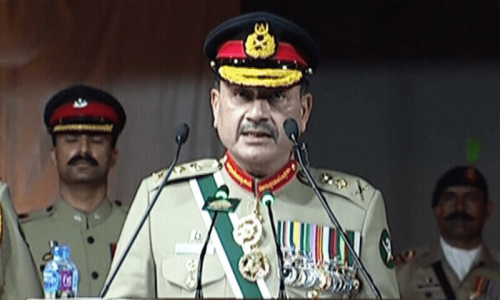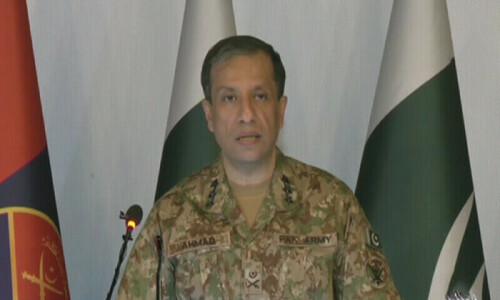Chief of Army Staff (COAS) General Asim Munir on Wednesday said it was the state’s responsibility to protect the public from the negative implications of social media.
According to a statement issued by state broadcaster PTV on social media platform X, the army chief said: “It is the responsibility of the state to keep the public away from the implications of social media-induced hysteria and fitna.”
Today’s statement was the latest in a long line of warnings from the army chief and the military about the dangers posed by social media.
Over the past couple of years, social media campaigns against the army have escalated, reflecting broader tensions within the country’s political and social fabric. The government, often in tandem with the military, has responded with stringent measures aimed at controlling the narrative and stifling dissent.
These measures have led to numerous arrests and legal actions against journalists and social media users accused of spreading “negative propaganda” about the military and the state, resulting in restricted internet access and bans on platforms like X.
In recent statements, the military took a harsh line against criticism on social media, with Gen Munir himself warning that it was being used as a tool to spread anarchy and false information targeting the armed forces.
The term ‘digital terrorism’ is increasingly being used by the military to describe the use of online spaces by its harshest critics — including PTI activists — whom it accuses of spreading falsehoods.
In the rest of his remarks today, the army chief said that only a strong relationship between the people, the government and the army guaranteed the country’s security and development.
“Those who were creating the narrative of Pakistan’s default, where are they today?” the army chief said.
He said the youth were the country’s “biggest and most valuable asset” and would not be allowed to “go to waste under any circumstances”.
Questioned about last month’s spate of tribal violence in Parachinar that left 49 dead, the army chief said the tribes should sit together and help end the various disputes between them.
“The people of Khyber Pakhtunkhwa stood like an iron wall against terrorism along with the Pakistan Army for 22 years. I believe that God will grant us victory against terrorism,” the COAS said.
Digital terrorism and social media
In a wide-ranging speech at a parade held to mark Independence Day, the army chief had blamed foreign powers for a wave of ‘digital terrorism’, which he said aimed to create a gulf between state institutions and the people of Pakistan.
Calling anti-terror activities under the umbrella of vision ‘Azm-i-Istehkam’ the need of the hour, Gen Munir vowed that elements trying to create such rifts would only reap disappointment.
On August 8, he had warned that social media was being used as a tool to spread “anarchy”.
Earlier month, military spokesperson General Ahmed Sharif Chaudhry had said that not enough was being done against “digital terrorism” under the law, allowing fake news and propaganda to spread in the country.
“It is the country’s law that has to control and curb digital terrorism [but] unfortunately, you can see that lies, propaganda — particularly on social media — fake news and doctored images continue to spread while confusion is created in the public’s mind,” he had said.
In May, the army had labelled the growing criticism directed towards it “digital terrorism” and declared a firm commitment to combat and defeat anti-military campaigns proliferating across online platforms.
The statement that marked further stiffening of the stance of the military towards online dissent and suggested an impending crackdown against the critics had come at the end of the 83rd Formation Commanders Conference.
The military’s reaction had come against the backdrop of a post on PTI founder Imran Khan’s X account in which he urged his followers to study the Hamoodur Rehman Commission Report on the events leading to the separation of East Pakistan.
The term had featured again in the 265th Corps Commanders’ Conference on July 5. The attendees had stressed that the “onslaught of politically motivated digital terrorism, unleashed by conspirators, duly abetted by their foreign cohorts against state institutions” was meant to induce “despondency in the nation and sow discord through peddling of blatant lies, fake news, and propaganda”.
Last month, the military spokesperson had said during a press conference that a false narrative was being propagated against the army and its leadership on social media, where “digital terrorists” were using tools such as cell phones, computers, falsehood, and propaganda to impose their will on society “akin to terrorists”.













































Dear visitor, the comments section is undergoing an overhaul and will return soon.